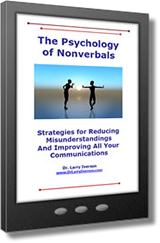Handle It – Dealing with Criticism and Negative Feedback (Part 4)
Order and download this entire nine-part audio program.
(…continued from last week)
Fear Distortion
The seventh of these is fear. Some people are so hesitant to criticize that the feedback comes across in a very disguised form. The persons’ fear of you, of reprisal, or being out done may make them want to not be wholly honest. They may be afraid of your response or harm to the relationship so they disguise the information in unhelpful ways. You may have to wait for hours to get real information because they are beating around the bush or they give you information they think you want to hear instead of what you do need to hear.
It’s Not All Bad
Criticism is not a bad thing. Negative feedback and criticism can be very helpful. If you need input to better stay on track with where you are going it can be of benefit to get information from others. Again the problem is that all too often this feedback you receive is tinged with emotions because of what is going on with the other person. We need to find a way to not allow ourselves to get dragged into the mire by other people’s issues.
Would knowing how to influence others to take action be of benefit to you?
Learn more »
Sometimes this negative input can be a source of learning. Every conflictual experience that you face in life is rich with positive and with negative potential. It can be a source of tangible or intangible gain, inspiration, enlightenment, learning and growth. Or that experience can cause rage, fear, shame, entrapment and/or strong resistance.
The choice really is not up to the person who is giving you this feedback but it is up to you and your willingness to be honest, to face and work through the situation, and manage yourself in the process of hearing the information.
Again, the difficulty in many cases is the information being given to you is clouded with the other person’s emotions, which makes it very difficult to accept.
Drop The Victim Role
Facing conflict and maintaining personal control, means giving up the scenario of seeing yourself as a victim, or the other person as an enemy. It requires giving up your fear of engaging in communications with someone you may distrust or who is giving you a hard time.
By adding new tools to your toolbox you can grow more skillful in front of your critics and manage the problem. You can choose to develop, grow, learn and become more effective in handling difficulties you encounter. You can position yourself to approach and engage criticism or the conflict constructively through a few ideas and actions. If there is a conflict you know you’ll be engaged in, think about where you want to have it. Set the scene to balance the power and not be on their turf if possible
Go to a neutral environment, do what you can to use skills of rapport, paraphrasing, listening, and active interaction. One of the things we all have to do to manage a situation is to disengage the fight or flight response, which is actually a very normal response. We need to find ways to clear our minds of what’s going on because when someone starts to get into our grill so to speak, we have a tendency not to want to hear it. Yet listening empathetically, getting the input, letting them know you are hearing them can make a difference.
Another thing that you can do is state clearly and without anger your needs and your interests and listen carefully to those expressed by the other person. As they’re giving you input let them know you are getting it and also let them know what you may need it to better understand the situation. You need to find a way to look below the surface of what is being said so you can resolve the underlying reasons for why this person is criticizing. All too often it’s not right on the surface, it’s hiding below.
Separate the Person from the Problem
We need to separate what is in the past from what’s going on now. We have to look at what the interests are that is driving this. In many cases what it means is we need to brainstorm solutions for conflict with this person.
We need to list as many solutions as we possibly can. Now, as they’re giving you input sometimes that’s really tough because it can be very pointed. Yet asking the other person to work with you to help you develop criteria to resolve the problem, to come up with ideas to manage it so it doesn’t happen again, sometimes knocks the props right out from the under their criticism.
They all of a sudden become a team member and a partner with you instead of being the person who’s the antagonist. When you negotiate collaboratively rather that aggressively, when you look for the values, the standards, the rules that can help, you communicate and work more effectively.
You can use informal problem solving, mediation, or other conflict management techniques to move through the impasses. One of the things that must be done though is to let go of your judgments about this person and focus instead on your own stuff and what’s going on with you. Then you can get on with it. If during the time they are criticizing you, you are mentally getting worked up or criticizing them, you will miss information that could benefit you. Listen and learn. Also, don’t just surrender so the conflict goes away. The point is not to avoid the conflict but to turn it into more of a collaborative, interactive, information gathering partnership.
Often searching for resolution or completion, searching for the problem or the issue is required. Something pushed their buttons and you can help them sort through what that is by slowing yourself down and not taking it personally because again this may not have a lot to do with you. It has a lot to do with the emotions. When you slow down and help them process by listening, by getting input, you can benefit. Listen for the kernel of truth inside of the feedback and let go of your conflicting emotions that will block you from gaining understanding.
(to be continued…)
Has this program caught your interest? Just can’t wait to hear the next segment? Or perhaps you’d like to download the entire program to your phone or tablet and listen during your travels? You can purchase and immediately receive this entire program as a digital download. Order Now: Dealing with Criticism
 The Psychology of Nonverbals
The Psychology of NonverbalsStrategies For Reducing Misunderstandings And Improving Your Communications! Becoming an exceptional communicator is a learned skill. Would knowing how to influence others to take action be of benefit to you? Do people ever misunderstand what you say? You can end that now. Learn the psychology of nonverbal language. Since over 90% of communication meaning is not from the words themselves, make your vocabulary work even better through applying the power of the 9 core aspects of nonverbals. Psychologist, trainer and author Dr. Larry Iverson will guide you through exactly how to use these proven communication strategies, in this “Psychology of Nonverbal Vocabulary” training session.
Posted: December 28th, 2016 under Audio Programs.
Tags: active listening, collaborator, communicate, conflict management, Criticism, criticize, emotions, fear, meditation, negotiate, paraphrasing, toolbox, victim







